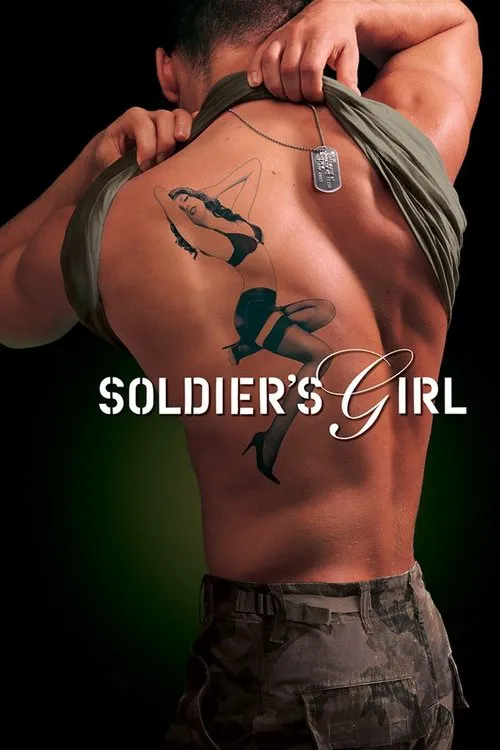Soldier's Girl

Plot
In the summer of 1999, the Fort Campbell in Kentucky served as home to numerous soldiers who were stationed abroad or on a temporary deployment. Their life was one of discipline and order, a far cry from the chaos that awaited Barry Winchell, a Private First Class in the U.S. Army. His life took a dramatic turn when he met Calpernia Addams, a talented nightclub performer and a member of the transgender community. What started as a casual encounter developed into a deep and all-consuming love, forcing Barry to confront the harsh realities of military life. The military's 'Don't Ask, Don't Tell' policy had been in place since 1994, aimed at minimizing the tension between gay and straight service members. While it was not explicitly stated, the policy implied a degree of acceptance for service members who chose to keep their sexual orientation hidden. Barry and Calpernia's situation, however, did not fit neatly into the military's expectations. They fell deeply in love, and their relationship became an open secret among their friends. Calpernia, who had undergone sex reassignment surgery, found acceptance in her new identity, while Barry struggled to reconcile his love for her with the societal norms that defined his military lifestyle. The challenges they faced began when Barry confided in a few close friends about his relationship with Calpernia. These friends, including Private Jeremy Hinton, initially expressed concern and eventually turned against Barry. As jealousy, misunderstanding, and a deep-seated hatred for those perceived as different consumed them, Jeremy and his peers took matters into their own hands. They plotted a revenge attack, determined to silence Barry and restore their twisted notion of honor. Behind the scenes, a web of manipulation and coercion was woven. Jeremy and Barry's friends used every trick to turn Barry against Calpernia, planting seeds of doubt that threatened to uproot their relationship. The tension escalated, and as the days went by, Barry remained steadfast in his love for Calpernia. Their bond became stronger, despite the efforts of those around them to break it. The evening of July 5, 1999, would prove fateful for Barry. At the 593rd Military Police Company mess hall, a confrontation between Barry and Jeremy unfolded, fueled by the hatred and anger they harbored. Barry refused to back down, refusing to abandon Calpernia for the sake of his fellow soldiers. The attack that followed was brutal. A baseball bat shattered on the concrete floor, a sound that echoed through the silence. Barry lay there, fighting for his life. In a state of panic, Jeremy and his acquaintances concocted a cover story to conceal their involvement in the attack. They accused Barry of breaking Jeremy's bat, leaving the soldiers in a state of confusion and suspicion. As the truth unraveled, a chilling reality emerged. Barry's fellow soldiers had taken the law into their own hands, punishing him for loving a woman who was not like them. The incident sparked widespread outrage and condemnation, forcing the military to confront its own shortcomings. In the days following the attack, Barry clung to life. His mother, who had always been by his side, arrived at the hospital, only to be met with a reality she could never have imagined. The military, too, struggled with the implications of their actions, realizing too late the extent of the damage caused by intolerance and hatred. As the case against Jeremy was prepared, the nation mourned the loss of a young soldier who fell victim to his own environment. Barry's death was met with protests, demands for justice, and a renewed call for the repeal of the 'Don't Ask, Don't Tell' policy that failed to protect its service members. The trial of Jeremy Hinton, and several other co-defendants, became a spectacle of injustice and a testament to the horrors of prejudice. Jeremy was accused of murder and ultimately convicted of the crime. He was sentenced to life in prison without parole. The court's verdict was met with relief and a sense of closure for the Winchell family, but the impact of the case lingered. Barry's story became a painful reminder of the dark realities that lurked beneath the surface of the military's seemingly pristine façade. Calpernia, too, found herself in the midst of a maelstrom of media and public attention, as she continued to navigate the complexities of her identity. The years following Barry's death saw a marked shift in public opinion and legislative policies regarding LGBTQ+ rights. The story of Barry and Calpernia's love became a beacon of hope for those who felt marginalized and oppressed. As the world grappled with the implications of Barry's life and death, it also learned an important lesson about acceptance, compassion, and the human cost of intolerance. The soldier's story became a testament to the power of love and a heart-wrenching reminder of the tragic costs of hate.
Reviews
Recommendations




